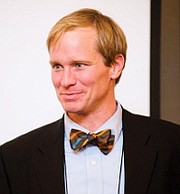Richmond Public Library to take over equipment, programming for city’s public access cable TV station
11/21/2018, 6 a.m.
The Richmond Public Library is poised to add a new element to its offerings — a TV studio that will allow residents to continue to air live shows on a Comcast public access channel.
Library Director Scott Firestine told the Free Press that the cameras and production equipment soon will be moved to the Main Library in Downtown from the public access studio Comcast has operated for nearly 30 years in its Richmond office, 918 N. Boulevard.
On Nov. 16, Comcast ended the live shows that local residents created and presented during the 6 to 10 p.m. time slot Tuesdays through Fridays on cable Channel 95 and switched to pre-recorded programming as part of the transition.
“This is something we have been working on since May,” Mr. Firestine stated about the library’s takeover of the public access operation. “It is an exciting opportunity for the library to provide a platform for citizens to have a voice and a classroom to learn how to use the technology,” he stated.
He expects the library to receive the equipment before Christmas, and indicated that the community programming would resume as quickly as possible, but on Channel 99.
“We hope to have as little interruption as possible during the transition,” Mr. Firestine stated.
He said it is too early to offer specifics as to when locally produced shows would resume. He said the library will run the operation and be responsible for the equipment. Comcast’s role will be to provide the engineering and bandwidth to enable the studio to link with and broadcast the programs.
“Current live shows will continue,” Mr. Firestine stated. “The volunteers are the heart and soul of this channel. We will work with them, and this will help minimize our costs.”
Andwele Gardner is hoping that will be the case. For the past 15 years, he has been one of the regular volunteer technicians who ensured that live shows aired. He is disappointed about the temporary halt to the live shows during the transition.
“It’s like losing a good friend,” said Mr. Gardner, 70, a retired federal government employee, who, with volunteer Akil Reel, manned the cameras, handled the sound and on-air connections.
He said other regular volunteer technicians, including David Aponte, Michael Hall, Rita Moore and Leroy Wilkins, worked other nights in support of the citizens who put on shows.
The local access programming covered the waterfront of local interests, ranging from shows on relationships to shows about contemporary music, food, religion, community activities and commentary on city and state politics. Comcast scheduled 12 shows a week, three a night. People with a show idea could compete for one of the three nightly spots every five weeks; shows could continue if there was no competition.
Mr. Gardner, who learned the technician ropes in Hawaii while volunteering at a public access station in Honolulu, said that the biggest problem at the Comcast studio was the aging equipment.
He said Comcast last provided new cameras and studio equipment in 2004. He and other volunteer technicians had their work cut out for them to keep the equipment operating, he said, although Comcast would make repairs when equipment went down.
In the future, repair and replacement of the equipment will be up to the City of Richmond.
Like others, Mr. Gardner believed Comcast was required to provide the public-use studio and often complained about the company’s decision not to invest in upgrading or replacing the equipment.
However, that is not the case. A review of the company’s most recent franchise deal with the city in 2007 shows that Comcast was not obligated to provide such a studio, but did so in continuing what was started around 1991 under a predecessor company, Continental Cable.
According to the franchise agreement, the company only has to provide the city with access to seven channels — only three are listed currently — and to pay an annual fee to provide financial support.
The current 2018-19 budget shows the city will receive $411,000 in public, educational and government programming fees, or P.E.G. fees, to cover the city’s cost of providing the public programming on the dedicated channels and the operation of its full-service TV studio that Comcast installed at City Hall decades ago.
City Hall, though, no longer lists employees as working at the studio, which appears to be used sparingly.
Three years ago, City Council shifted a large share of the P.E.G fee, $261,000, to support the website and other public outreach of the City Clerk’s Office. The remainder, $150,000, has gone to the Office of the Press Secretary. None of the money has been used to support Comcast’s public access studio, according to the city budget.
Mr. Firestine indicated that is likely to change. While he stated that the library system’s costs for operations “should be minimal” if the volunteer show producers and technicians are willing to keep working with the station, “the equipment would need to be upgraded, and P.E.G. funding would be requested for this need.”








